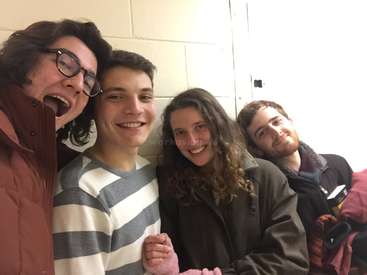Profile information

Host rating
65 %

Last replied
2 Jan 2023

Feedback
1

Facebook verified

Email verified
Badges (2)



Find your perfect host
Details

Description
To attend college in Ecuador, all students must pass an English proficiency test, and while English education is a required part of all students’ curriculum, there is a marked shortage of English teachers in the country. This results in a concentration of English teachers in the schools of the cities while the rural, dominantly Indigenous, schools are left without access to the education necessary for admission to higher education. In one of our partner communities, Balda Lupaxi, not a single child has gone on to attend college since the entrance exam laws went into effect in the late 90’s. Such discriminatory laws are one of the primary reasons that in the rural areas of the central Ecuadorian highlands, 95% of the population still lives in poverty.
This is an indigenous-led education initiative, founded to aid Kichwa community schools and give children from the villages a chance at escaping poverty. In the Kichwa language, “yanapak yachachikuna” translates to “servant teachers,” which is what we aim to be for the communities we work alongside.
Volunteers are placed in a home stay in a Kichwa community in the rural Ecuadorian Andes. The Fundation was founded in Fall of 2016 by an indigenous Kichwa professor and pastor and a US volunteer. That said, we are just getting the program off the ground and, while we will take care of food, housing, and all the basics, every community is different with slightly different needs, and each volunteer (or set of volunteers) we get will bring a new community into the network so no volunteer's experience will be quite the same. This is an exciting opportunity to help jump-start a fledgling non-profit, bring English and arts instruction to folks who could otherwise have no access, and immerse yourself in Kichwa culture and life.
Types of help and learning opportunities
Charity Work
Art Projects
Language practice
Teaching
Animal Care
Farmstay help
Help with Computers/ Internet

UN sustainability goals this host is trying to achieve

Cultural exchange and learning opportunities
As a current volunteer writing this I can tell you that immersion in post-colonial indigenous society is a world-flipping experience, and in so many ways I had never expected. Of course you'll become accustomed to local cultural norms attached to clothing, crafts, medicine, food, religion, and such, but I've lost track of the number of times I've found myself saying ".......huh, well that completely changes how I think/talk about that," as is inevitable when you spend months in a community likely unlike anywhere you've been.

Help
Volunteers will provide a few hours of instruction each weekday in addition to optional help with local agricultural projects. The majority of volunteers will be teaching elementary and middle school aged children with little to no prior English instruction. No certification in teaching of any sort is required, and if you need we can recommend some good books to prepare first time EFL teachers. However, at least a conversational level of Spanish is a necessity since next to no one in the communities speak English.
Most volunteers will be placed in local community schools, so we ask volunteers to stay for at least half the school year (preferably the full school year) which begins at the end of August and goes to the end of June.
Languages
Languages spoken
Spanish: FluentThis host offers a language exchange
This host has indicated that they are interested in sharing their own language or learning a new language.
You can contact them directly for more information.
Accommodation
Home stay with a local Kichwa family. Things definitely provided: bed, food, electricity, company and conversation. Things not necessarily (but possibly) provided: bathroom (many families use an outdoor "squatty potty").
If you prefer, accommodations may be made for you to stay in your own house and not with a family, though we may not be able to assure you 3 free meals a day in this circumstance.
What else ...
Chimborazo is right in the center of Ecuador, so you're never more than a few hours bus ride from amazing sights and experiences. Buses, like most things here, are quite cheap (compared to the US) and within a weekend trip radius you have the Amazon rain forest, gorgeous beaches of the pacific ocean, and breathtaking treks through the Andes (including mt. Chimborazo, the tallest mountain in the world, measured from the center of the earth). There will also be plenty of opportunities to invest yourself further in the community during a (community work day) or in any of the many fiestas (especially in the months between Christmas and Easter).

A little more information

Internet access

Limited internet access

We have pets

We are smokers

Can host families

Can host digital nomads
This host has indicated that they love having digital nomads stay.

Space for parking camper vans
This host can provide space for campervans.

Can possibly accept pets
This host has said they are willing to accept those travelling with a pet.

How many Workawayers can stay?
More than two

My animals / pets








































